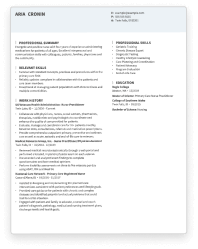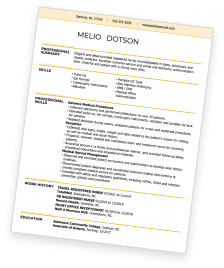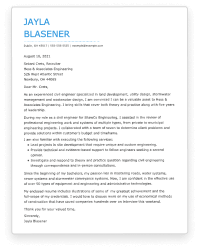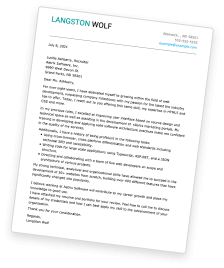Business Intelligence Analyst Resumes: Overview
As a business intelligence analyst, you develop and manage intelligence solutions, provide reports to improve business processes, collaborate with teams to collect data, and identify the development needed to improve operations for efficiency and profitability.
Business intelligence analysts work in a variety of settings, including:
- Corporate Offices
- IT Firms
- Healthcare Organizations
- Financial Institutions
- Government Agencies
You have mastered data analysis, statistical modeling, and business acumen to be a successful BI analyst. Now it’s time to showcase your skills to land your dream job by building a great resume!
If you are ready to find your next business intelligence analyst position, Hloom is here to help!
Explore our extensive collection of resume examples and customize a downloadable template to get started!
Business Intelligence Analyst Resume: Choose a Format
Choosing the best format to highlight your skills and experience is crucial when crafting your business intelligence analyst resume.
Each format emphasizes different aspects of your qualifications. There are three resume formats for a business intelligence analyst to consider.
Chronological Resumes for Business Intelligence Analyst
The first and most common choice for a BI analyst resume is a chronological format. A chronological resume is ideal for an experienced business intelligence analyst. It is perfect for highlighting your expertise and accomplishments over the years.
This format lists your career progression in reverse chronological order. Then, you can provide information about your previous job responsibilities and accomplishments in bulleted sentences beneath each job entry.
Chronological resumes are also highly compatible with applicant tracking systems (ATS), ensuring your resume will pass initial screenings and get into the hands of a hiring manager.
Functional Resumes for Business Intelligence Analyst
The next format to consider is a functional resume. A functional format lets you spotlight your key skills and qualifications, making it perfect for someone just starting their BI analyst career, transitioning between industries, or re-entering the workforce.
For example, a recent graduate with no relevant work experience may choose a functional format to showcase technical and computer knowledge, experience gained from school projects, and educational background.
However, it is important to note that employers place a high value on work experience, and functional resumes are not compatible with applicant tracking systems. That doesn’t mean you should never use this format, but it is good to understand its limitations.
Combination Resumes for Business Intelligence Analyst
The third option is a combination resume format. This format merges the best of both worlds.
It places an equal emphasis on your skills and your work history. A combination resume provides a detailed skills section above the work history section to provide a well-rounded picture of your qualifications for the business intelligence analyst position.
This format works well for a business intelligence analyst with limited relevant work experience who wants to showcase their skills and knowledge alongside their professional journey. It can also work well for someone transitioning from a different field.
Choosing a Resume Format
Choosing the right resume format is a critical first step in writing your business intelligence analyst resume.
For business intelligence analysts, the chronological format is often the safest choice. Not only is a chronological ATS-friendly, but it also allows you to customize your resume to suit any level of experience.
Even if you lack relevant work experience, you can still tailor your resume to showcase transferable skills and qualifications.
For example, you can use the bulleted sentences beneath each job entry to showcase relevant skills in communication, problem-solving or data management.
How to Write a Business Intelligence Analyst Resume
Once you have chosen a resume format, you can begin writing your resume content. There are five key sections to include in a resume for a business intelligence analyst:
- Contact Information
- Summary or Objective
- Work History
- Skills
- Education
Let’s dive into how to write each section of your resume to showcase your talents and land your next business intelligence analyst job!
Contact Information
First, you will provide your current contact information. Place this section prominently at the top of your business intelligence analyst resume, ensuring that it is easy to find and easy to read.
Your contact information should include your first and last name, city and state where you reside, email address and telephone number.
You can also add your LinkedIn profile if you like. Just make sure your picture and information are current.
Depending on your resume template’s design, the exact format of your contact information may vary, but should look something like this:
Jane Smith
Union City, NJ
janesmith@example.email.com
555-555-5555
fake.linkedIn/in/JaneSmith
Always check your contact information for errors! After all, potential employers can’t reach you if your contact information is not accurate and up-to-date.
Summary or Objective
Next, you will craft a compelling resume summary or objective statement to engage the reader and entice them to keep reading your resume.
A resume summary briefly overviews your experience as a business intelligence analyst and your most relevant skills and qualifications.
For example, a resume summary for a business intelligence analyst resume may look like :
“Results-driven BI analyst with a proven track record in transforming complex data into actionable insights. Skilled in statistical modeling and data visualization, contributing to increased efficiency and informed decision-making.”
Choose a resume summary if you have any relevant work experience.
However, if you don’t have previous experience related to business intelligence or data analysis, an objective statement may be the better choice.
An objective summary expresses your genuine interest in the position while introducing your most relevant skills.
For example, an objective statement for a business intelligence analyst resume may look like :
“Aspiring business intelligence analyst seeking an opportunity to apply analytical skills and leverage data insights to drive business growth. Proficient in data manipulation and visualization tools, eager to contribute to a dynamic team.”
Whether you choose a resume summary or an objective, keep it concise. This statement should be at most two to three sentences long.
This section is also an excellent opportunity to make your resume more ATS-friendly by using keywords from the job description.
Work History
Next, you will create your work history section. Start by listing your previous jobs in reverse chronological order, starting with your most recent position.
Each job entry should include your job title, the employer’s name and location, and the dates you worked there.
Then, write at least three bulleted sentences describing your responsibilities, achievements and impact in each role.
When detailing your work history, focus on your most relevant accomplishments. Highlight specific projects, quantifiable achievements, and impact on business outcomes.
Use strong action verbs to engage the reader, and use numbers and percentages to convey the impact of your contributions.
For example:
Implemented a predictive analytics model that increased sales by 15% within the first quarter.
Quantifying the work history section of your BI analyst resume is key to standing out with employers by showing the specific value you offer as an employee.
Look for opportunities to use industry terminology and keywords from the job description to show your alignment with the job requirements and get the attention of recruiters and hiring managers.
All of that considered a work history entry on a business intelligence analyst resume may look like this:
Business Intelligence Analyst
Acme Corp, San Francisco, CA
May 2020 – Present
- Spearheaded the automation of data collection and analysis processes, reducing report generation time by 40%.
- Developed and implemented a predictive analytics model that leveraged historical data to forecast sales trends, resulting in a 15% increase in sales within the first quarter of deployment.
- Designed and launched an interactive dashboard that provided real-time insights into key performance indicators (KPIs), customer behavior patterns, and market trends, enabling stakeholders to make data-informed decisions, leading to a 10% improvement in customer satisfaction scores, a 5% increase in operational efficiency.
- Actively collaborated with the marketing and sales departments to align business intelligence initiatives with strategic goals.
- Led a project that integrated CRM and ERP systems with business intelligence tools, enhancing data visibility and supporting a 20% improvement in lead conversion rates.
Skills
Then, in a dedicated skills section, you will list your most relevant skills for the business intelligence analyst position you are applying for.
Include both hard and soft skills to provide a complete picture of your professional abilities.
Technical skills are especially important for business intelligence analysts, such as specific computer skills that help with data analysis.
Although you should tailor your resume to the specific BI analyst position you are applying to, we have compiled the top five hard skills and soft skills for BI Analysts for inspiration:
Top 5 Hard Skills for Business Intelligence Analyst Resumes
- Data Analysis: Let potential employers know you have mastered deciphering intricate data sets, revealing patterns, trends, and critical information for informed decision-making. Showcase your proficiency in transforming raw data into actionable insights, highlighting your impact on organizational strategy.
- Structured Query Language (SQL): Demonstrate your expertise in SQL to showcase your capability to navigate and manipulate databases seamlessly. Proficiency in SQL empowers you to extract, transform, and load data efficiently, ensuring a streamlined and accurate analytical process.
- Business Intelligence Tools: Using tools like Tableau and Power BI to articulate complex data visually is essential to your work as a BI analyst. Illustrate your ability to create compelling dashboards and reports, transforming data into accessible and persuasive visual narratives. Showcase your proficiency in driving data-driven decision-making through intuitive visuals.
- Statistical Modeling: Business intelligence analysts must apply statistical techniques to uncover hidden patterns and trends within data sets. Showcase your ability to derive meaningful insights, enabling organizations to make informed strategic decisions. Emphasize your statistical modeling skills to underscore your role in driving data-driven innovation.
- Data Visualization: Illustrate your knack for creating visually impactful representations of data, ensuring that both technical and non-technical stakeholders easily understand your insights. Your proficiency in data visualization enhances communication and decision-making processes.
Top 5 Soft Skills for Business Intelligence Analyst Resumes
- Analytical Thinking: Showcase your ability to dissect intricate issues and provide precise, data-driven solutions. Highlight how your analytical thinking contributes to improved decision-making within the BI landscape.
- Communication: Your ability to effectively communicate data insights to non-technical stakeholders is crucial to success as a business intelligence analyst. Showcase your capacity to translate complex analytics into understandable narratives, fostering collaboration and ensuring that data-driven insights are comprehensible across all organizational levels.
- Problem-Solving: Demonstrate your prowess in developing innovative solutions to intricate business challenges. Including this skill lets potential employers know you can navigate and resolve complex issues efficiently.
- Attention to Detail: Emphasize your commitment to accuracy in data analysis and reporting. Your attention to detail in handling intricate data sets ensures that your analytical outputs are error-free and reliable. Illustrate how your meticulous approach enhances the quality of BI insights.
- Business Acumen: Highlight your ability to connect data findings with overarching business goals, demonstrating your value in shaping organizational strategies.
On a resume for a BI Analyst, your skills section may look something like this:
Skills:
- Market analysis
- Trend monitoring
- SQL
- Communication
- Attention to detail
- MS Power BI
Education
Next, you will provide your educational background. List your degree, major, university, and location. You can also include any relevant coursework, honors, or academic achievements.
The exact format of your education section will depend on your resume design. Still, it may look like this:
Master of Business Administration (MBA)
XYZ University – Phoenix, AZBachelor of Science: Information Systems & Business Analytics
ABC College – Tucson, AZ
Most business intelligence analyst jobs require a minimum of a bachelor’s degree or higher, so it is crucial to demonstrate your qualifications by including your educational background in your resume.
Additional Sections
Once you have crafted the above five key sections of your resume, consider adding optional sections to showcase your qualifications further.
As a BI analyst, some additional sections to consider include:
- Certifications
- Project portfolio
- Languages spoken
- Publications
- Professional memberships
Sometimes, you can include this information in other sections of your resume.
However, if you want to emphasize a particular piece of information, putting it in a separate section can make it stand out.
Top Certifications For Business Intelligence Analysts
Certifications can be an excellent addition to your business intelligence resume.
Obtaining certifications demonstrates your commitment to continuous learning and professional development. Some popular certifications for a business intelligence analyst include:
- Microsoft Certified: Power BI – Achieving this certification validates your expertise in leveraging Power BI for advanced data visualization and business intelligence.
- Certified Business Intelligence Professional (CBIP) – This certification establishes you as a recognized BI professional with a comprehensive understanding of key BI concepts, including data analysis, business reporting, and strategic planning.
- SAS Certified BI Content Developer – Highlight your skills in creating and managing BI content using SAS tools. This certification showcases your proficiency in designing effective BI solutions, enabling organizations to extract maximum value from their data through SAS platforms.
- Tableau Desktop Specialist – Attaining the Tableau Desktop Specialist certification signifies your proficiency in using Tableau for data visualization to create impactful dashboards and reports and convey complex data insights visually.
- Oracle Business Intelligence Foundation Suite 11g Certified Implementation Specialist – Demonstrate your specialized knowledge in implementing Oracle BI solutions. This certification highlights your expertise utilizing Oracle BI tools to design, deploy, and optimize BI solutions.
8 Tips for Writing a Business Intelligence Analyst Resume
Tailor Your Resume to the Specific Job: Align your resume with the unique requirements of the job description to maximize its impact. Tailoring ensures that your skills and experiences directly resonate with the employer’s expectations, increasing your chances of standing out.
Amplify Your Achievements: Elevate your resume by emphasizing quantifiable achievements and their direct impact on business outcomes. Showcase specific instances where your analytical prowess contributed to tangible, positive results, providing concrete evidence of your value by using numbers and percentages.
Strategically Infuse Keywords: Strategically incorporate relevant keywords throughout your resume to successfully navigate applicant tracking systems (ATS). Optimize your chances of getting noticed by aligning your language with the specific terms and phrases used in the BI industry and the specific job posting.
Showcase Technical Proficiency: Demonstrate your expertise in BI tools, SQL, and data analysis. Provide concrete examples of projects where you applied these skills, showcasing your ability to leverage technology for insightful data interpretation and strategic decision-making.
Include Soft Skills for Impact: Highlight soft skills such as communication, problem-solving, and business acumen. Illustrate how these qualities complement your technical proficiency, emphasizing your ability to collaborate, innovate, and align BI strategies with broader business goals.
Conciseness is Key: Craft a concise, one-page resume focusing on the most relevant information. Streamline your content to capture the recruiter’s attention without overwhelming them with unnecessary details.
Use Dynamic Action Verbs: Energize your resume by starting bullet points with strong action verbs like analyzed, developed, designed and created. Action verbs create a dynamic narrative that conveys your proactive contributions and achievements, leaving a lasting impression of your initiative and impact.
Ensure Polished Professionalism: Always proofread your resume to eliminate errors and present a polished, error-free document. A meticulously crafted resume conveys professionalism, attention to detail, and a commitment to delivering high-quality work—a crucial reflection of your abilities as a BI professional.
Helping Job Seekers Like You


Use Hloom's Resume Builder
Key Takeaways
- Tailor your resume to the job description for maximum impact.
- Use numbers and percentages to quantify achievements to showcase your contributions.
- Emphasize both technical and soft skills for a well-rounded profile.
- Choose a chronological resume format for clarity and ATS-friendliness.
- Craft a compelling summary or objective to grab employers’ attention.
Use Hloom's Cover Letter Builder













